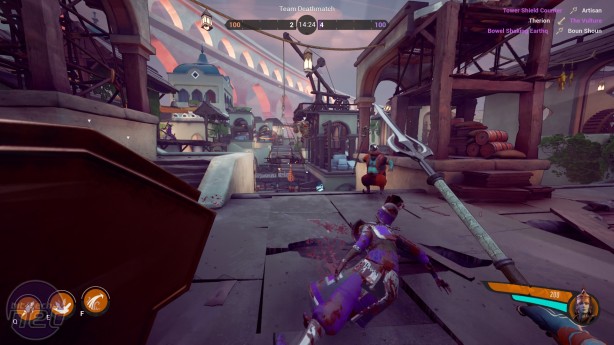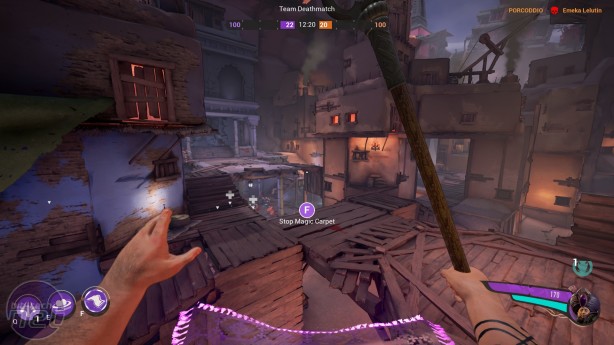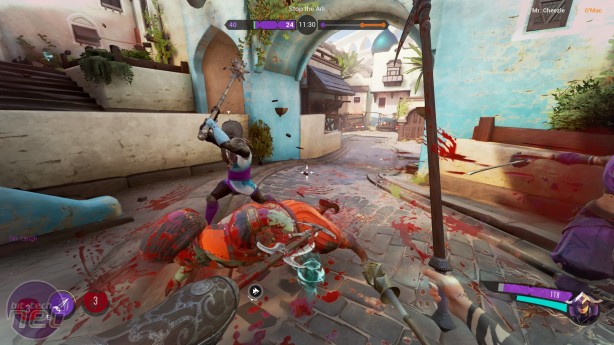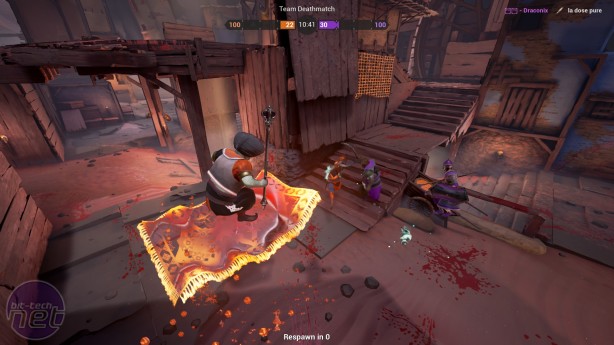
There’s no doubt these abilities add to the chaos and spectacle of Torn Banner’s combat. Where Chivalry felt at least somewhat inclined to realism, Mirage is quite happy to include strikes and abilities that will punt an opponent’s corpse right across the map, which always elicits a giggle when it happens. The weapons communicate this pent-up power effectively as well. During one game, a player in the chat remarked that the Taurant’s melee blows 'sound like a 50 cal.', which sums it up well enough.
The problems I have with Mirage’s class-based combat are twofold. Firstly, the magic itself feels like a half-measure, a side-dish to the game’s largely unchanged combat system. This is partly a failure of expectation, but I imagined that Mirage would lean much closer to something like competitive Magicka, where players blasted each other into oblivion with dazzling, explosive spells. Instead, it’s basically Chivalry with slightly more colourful combat, and although that’s fun enough, it doesn’t excite me.
A bigger issue is that Mirage doesn’t fix some of the fundamental flaws evident in Chivalry’s combat system. Chivalry was quite a slow and ponderous fighting game, often feeling like the air possessed the consistency of treacle. This I could forgive because it was also inventive and enjoyable. But I had hoped Mirage would provide a sharper, more refined experience. Sadly, this isn’t the case. Weapon swings are just as sluggish as before, which isn’t so bad when you’re playing as the Taurant, but if feels outright wrong with some of the smaller, nippier characters like the Viperess.
There are problems beyond the core systems, too. I don’t like the aesthetic at all. At a base level Mirage is quite a pleasant-looking game, with some attractively designed maps and an original theme that is rarely explored in gaming. But the developers have slathered this in an orange and purple colour-scheme which is like being poked in the eye with a broken kaleidoscope. It’s horribly garish. I think the aim is to replicate the warm colours of Arabian days and nights, but it goes too far, and the result is an aesthetic style that distracts from the game’s distinctive theme rather than contributing to it.
Meanwhile, the superb Team Objective mode from Chivalry, wherein each map had custom objectives that saw players besieging castles and setting the torch to peasant villages, has been gutted. In its place is a far less distinctive range of general objectives which bear strong similarity to those seen in Overwatch, such as escorting a payload and chasing control points. Alongside the unappealing visual style, this further adds to Mirage’s generic feel.
By far Mirage’s biggest problem, though, is that hardly anybody is playing it. During my time with it only one of the 20-player servers was full, and the rest were empty. Below these were perhaps a dozen other populated servers, each with 12 or just six people playing. This isn’t the fault of the developer, obviously, but it does make it rather difficult to find a game with a decent number of players in it, and sadly that affects the overall experience.
I wish I could be nicer to Mirage, because I have a soft spot for Torn Banner, but sadly Arcane Warfare is a disappointment. The core combat functions well enough, and it is still capable of inadvertent comedy as Chivalry was. But the magical abilities don’t add enough to the combat to make up for the lack of more basic improvements, and I found the whole experience to be less unique or streamlined compared to Torn Banner’s debut game. I hope Mirage finds a following, because I like what Torn Banner do, but the game itself is not for me.
The problems I have with Mirage’s class-based combat are twofold. Firstly, the magic itself feels like a half-measure, a side-dish to the game’s largely unchanged combat system. This is partly a failure of expectation, but I imagined that Mirage would lean much closer to something like competitive Magicka, where players blasted each other into oblivion with dazzling, explosive spells. Instead, it’s basically Chivalry with slightly more colourful combat, and although that’s fun enough, it doesn’t excite me.
A bigger issue is that Mirage doesn’t fix some of the fundamental flaws evident in Chivalry’s combat system. Chivalry was quite a slow and ponderous fighting game, often feeling like the air possessed the consistency of treacle. This I could forgive because it was also inventive and enjoyable. But I had hoped Mirage would provide a sharper, more refined experience. Sadly, this isn’t the case. Weapon swings are just as sluggish as before, which isn’t so bad when you’re playing as the Taurant, but if feels outright wrong with some of the smaller, nippier characters like the Viperess.
There are problems beyond the core systems, too. I don’t like the aesthetic at all. At a base level Mirage is quite a pleasant-looking game, with some attractively designed maps and an original theme that is rarely explored in gaming. But the developers have slathered this in an orange and purple colour-scheme which is like being poked in the eye with a broken kaleidoscope. It’s horribly garish. I think the aim is to replicate the warm colours of Arabian days and nights, but it goes too far, and the result is an aesthetic style that distracts from the game’s distinctive theme rather than contributing to it.
Meanwhile, the superb Team Objective mode from Chivalry, wherein each map had custom objectives that saw players besieging castles and setting the torch to peasant villages, has been gutted. In its place is a far less distinctive range of general objectives which bear strong similarity to those seen in Overwatch, such as escorting a payload and chasing control points. Alongside the unappealing visual style, this further adds to Mirage’s generic feel.
By far Mirage’s biggest problem, though, is that hardly anybody is playing it. During my time with it only one of the 20-player servers was full, and the rest were empty. Below these were perhaps a dozen other populated servers, each with 12 or just six people playing. This isn’t the fault of the developer, obviously, but it does make it rather difficult to find a game with a decent number of players in it, and sadly that affects the overall experience.
I wish I could be nicer to Mirage, because I have a soft spot for Torn Banner, but sadly Arcane Warfare is a disappointment. The core combat functions well enough, and it is still capable of inadvertent comedy as Chivalry was. But the magical abilities don’t add enough to the combat to make up for the lack of more basic improvements, and I found the whole experience to be less unique or streamlined compared to Torn Banner’s debut game. I hope Mirage finds a following, because I like what Torn Banner do, but the game itself is not for me.

MSI MPG Velox 100R Chassis Review
October 14 2021 | 15:04













Want to comment? Please log in.